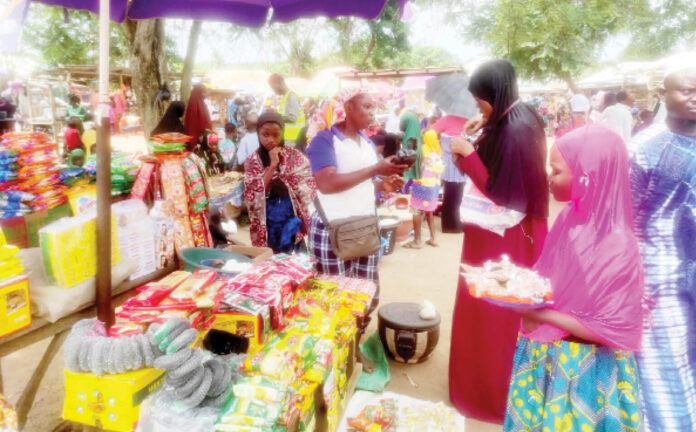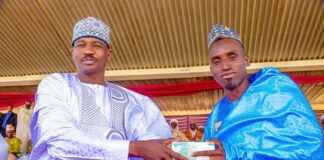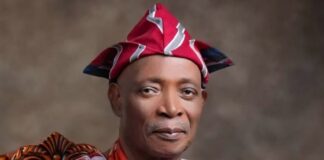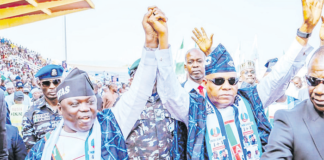By Daily Trust
Islamic market where food items are cheaper discovered in Iwo, Osun – REPORT
A prominent Islamic scholar in Iwo, the Grand Mufti of Yorubaland, Sheikh Daud Imran Molaasan established the Islamic market
Iwo, an ancient town in Osun State, is said to be the most populous local government area in the state, according to the 2006 Nigeria National census figures of 191,348.
It has over 30 traditional rulers, all under the Oluwo of Iwoland, Oba Abdulrasheed Adewale Akanbi, as the only Consenting Authority and first-class paramount ruler of Iwoland.
Iwo has social amenities and infrastructure, including network of roads, schools, markets and other modern social amenities and places of interest. Odori market in Iwo is very popular and people from all parts of Yorubaland converge there every five days for trading. Other prominent markets in Iwo are Oja-Ale, Oja-Oba and Kara.
However, a unique market has emerged in Iwo with its distinct peculiarities. Known as Islamic market, with a clear departure from the old order, the concept has been embraced by the people of Iwo and the market is fast growing in a predominantly Muslim community renowned as home of Islamic scholars and for promoting Islamic tenets.
The Islamic market was established by a prominent Islamic scholar in Iwo, the Grand Mufti of Yorubaland, Sheikh Daud Imran Molaasan, who’s also the President of Taawun Iain Movement. He said the idea was to liberate the poor as prices of commodities skyrocket in markets across the country sequel to the removal of fuel subsidy by President Bola Ahmed Tinubu.
Weekend Trust observed that the situation is compounded by imposition of levies by associations and unions in the markets as well as multiple taxation by agents of local and state governments.
Weekend Trust gathered that items are cheaper at the Islamic market compared to other markets in Iwo. Residents said traders in other markets are now being forced to reduce their prices due to the development. At the Islamic market, there is no union or association levy and prices of commodities are regulated in a way that the sellers and buyers are happy.
A fish seller, Mrs Opadoja Anifat Okikiola, said the fish she sells for N450 at the Islamic market will cost N600 in other markets because of the levies and several charges paid by traders in those areas. Opadoja explained that she makes profit despite selling at a cheaper rate.
According to her, “Here at the Islamic market in Iwo, I sell at a cheaper rate and I still make profit. I dare not sell like this in other markets where they collect charges, levies and taxes from us. When we go to other markets, we have to factor in all the charges paid to unions and market associations and tickets by local and state government agents. Once we pay all the levies and charges, we can sell at any amount we want.
“In fact, anyone that sells at a cheaper amount would face the wrath of fellow traders and the market leaders. But at the Islamic market, the market management appointed by the Grand Mufti will find a reasonable price and then advise the traders to sell at a particular amount so that they will make moderate profit, and we like it that way.”
Another trader, Mutairu Abubakar, who sells onion, also said the market favours both the traders and buyers. He expressed optimism that the market would keep growing bigger. He lauded the founder and management of the market for the initiative and monitoring of activities.
He said, “Our prices are okay. We sell onion at N500, N1,000 and 1,500, depending on the capacity of the buyers. We believe the market will continue to improve and grow as time goes on. We are grateful to Sheikh Daud Imran Molaasan for this initiative. He has liberated us from economic hardship and this has made life easier for the people of this town.”
A pepper seller in the market, Qawiyu Abdul-raheem, said he is happy that the market is in compliance with Shari’a. Abdul-raheem said the Islamic market is devoid of fraudulent behaviour and that trading in in accordance with the dictates of the Qur’an and tradition of the Holy Prophet, Muhammad (SAW).
He said, “I’m happy bringing my pepper here on market days. Here, no one compels me to sell at a high price like in the other markets. “Here, the market management gave us shop without collecting money from us. They did not ask us to pay any levy”.
An Iwo resident, Islamaiyat Jamiu, said the Islamic market offers her better opportunity to buy food stuff at cheaper rates.
“This Islamic market is good for us. With a little amount of money, I was able to buy the things I needed. The market attracts people from all parts of Iwo. In fact, people from different backgrounds come here. It’s not for Muslims only. Christians also come to sell or buy. It’s not for Yorubas only. There are Hausas and Igbos and other tribes in this market. This Islamic market is for all and it favours the poor”, she said.
Another resident, Lasisi Saheed Olaide, also agreed that the Islamic market gives succour to the people of Iwo. He said the market helps people with low income to be able to buy more with small amount of money. He also commended the founders of the market for the initiative. He appealed to the state government to give necessary support to the Islamic market to continue to thrive.
He said, “With this Islamic market, things are easier in this town. The Islamic market is a saving grace. In fact, people from other parts of the country buy items such as yam from here because it is cheaper. The buyers place orders for the yams and they are way-billed to them wherever they reside. So, it’s a good idea and the market is really fast growing. We hope it would soon become a very big market.”
However, the Islamic market is contending with certain forces as market associations and unions from other markets stand in opposition. Sheikh Molaasan explained that he came up with the initiative as part of solution to the economic hardship.
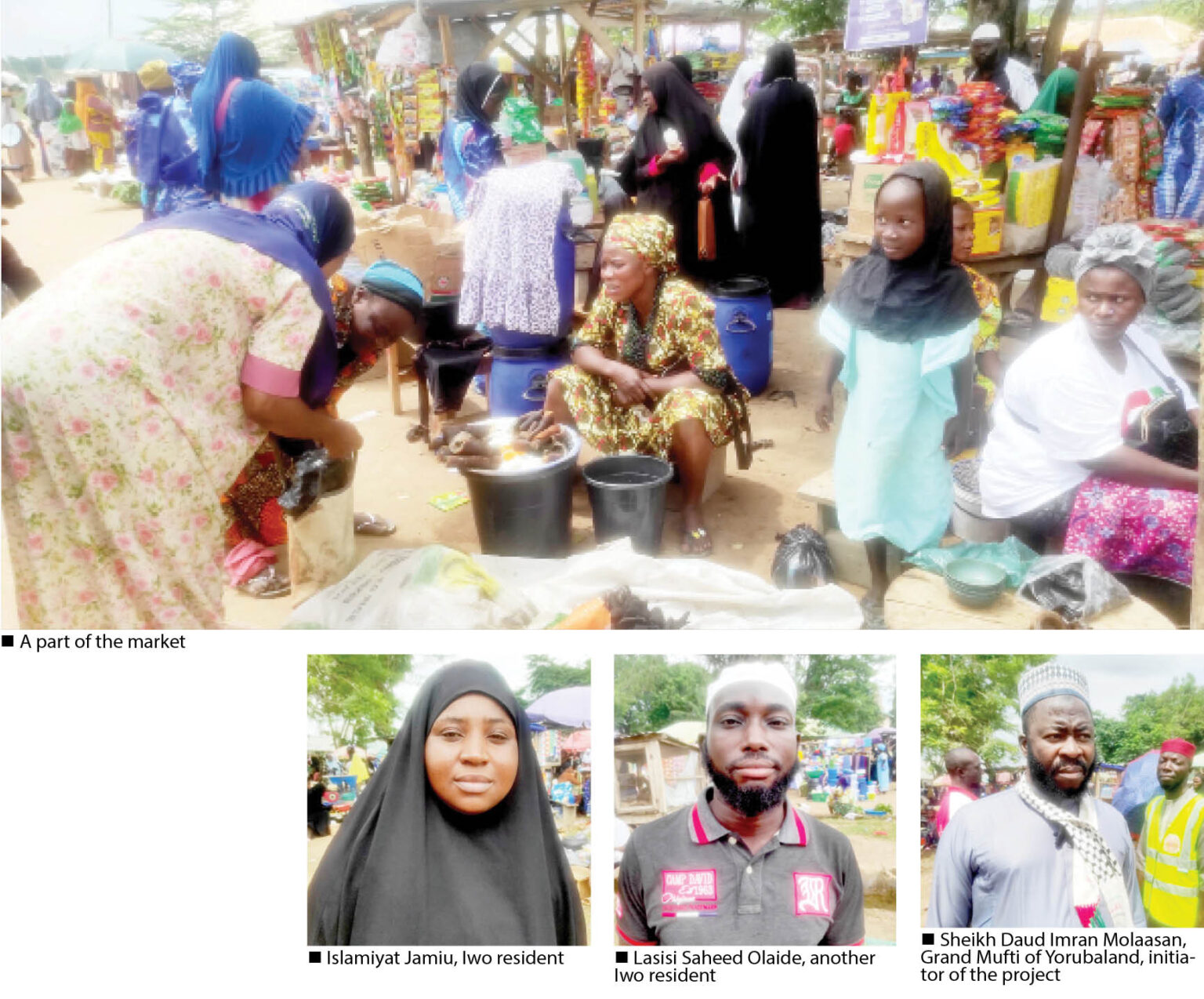
“We established this market having realised the suffering people are experiencing. We know things are very tight for people because prices of commodities have gone up. We felt there must be a solution to this problem, so we started the Islamic market with few traders who share our ideology. Later, other traders joined us and started bringing their wares to sell here. Eventually, a lot of sellers and buyers started thronging the market. We keep appealing to traders to sell at reasonable prices and make moderate gains. We do not charge them any fee. We give them spaces free of charge. So, they are happy selling at lower prices and gain a little.
“The leadership of market associations and unions were not happy with this development because traders in other markets had to also adjust their prices, as people were coming to the Islamic market to buy at cheaper rates. They reported us to the Oluwo of Iwoland, Oba Abdul Rasheed Adewale Akanbi, that we disrupted their business. But Oba Akanbi is on our side. He gave us backing to continue with the market. The individuals ran to the police station to report us, but the police said we have not contravened the law. So, they took the matter to Iwo Board of Trustee and we were summoned. When we got there, the Iwo Board of Trustee asked them why they could not sell at cheaper prices like the Islamic market and they gave their reasons. The Iwo Board of Trustees also asked us how we were able to regulate prices such that the traders and buyers are happy. We explained and the Iwo Board of Trustees said we could continue with our Islamic market concept, ”he said.
Molaasan said he had plans to collaborate with farmers to be taking their produce to the market for the people to buy directly without the involvement of intermediaries. He also has plans to set up mechanised farms so that produce from there would be sold at the Islamic market at reasonable prices. He called on farmers from far and near to bring their goods to the market, assuring them of adequate security. …Continue Reading
Credit: Daily Trust

